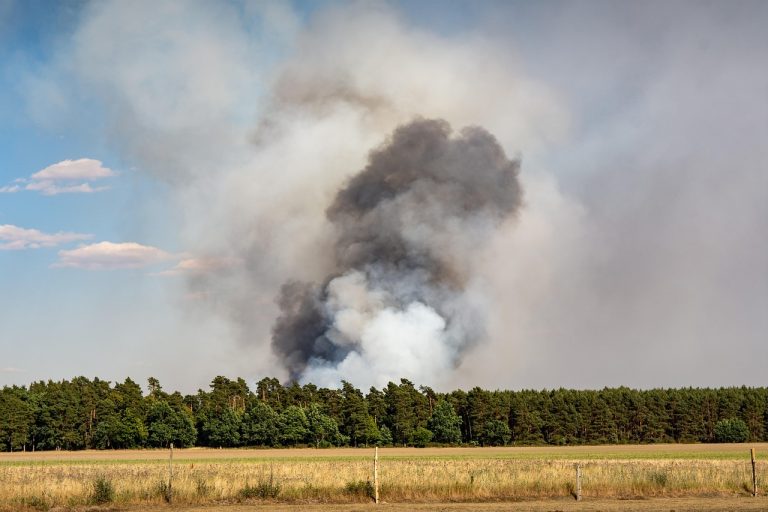
Trump-aligned U.S. lawmakers aren’t the only ones fanning the flames of wildfire disinformation. Researchers warn that American social media platforms are playing a crucial role in spreading a fog of falsehoods about the devastating wildfires across Canada—while obscuring the fossil fuel industry’s responsibility in the crisis.
“What Canadians should really be concerned about is how these outrageous conspiracy theories are being imported from American politicians,” said Michael Khoo, policy and development co-director at Climate Action Against Disinformation, the group behind the latest findings.
Between April 21 and June 20, seven right-wing outlets, influencers, and think tanks reached millions online with false or misleading narratives about the wildfires. Among them were Rebel News, The Daily Skeptic, Bjorn Lomborg, Jasmin Laine, Marc Nixon, The Fraser Institute, and the Heritage Foundation.
Much of the disinformation found a home on X (formerly Twitter), the platform now owned by Elon Musk—a known ally of far-right figures and causes. According to researchers, X has become a breeding ground for conspiracy-driven wildfire content, with little effort made to stop its spread.
The narratives pushed online vary, but share a common thread of distortion. Some claim arson is the main cause of the fires. Others accuse the government of intentionally holding back firefighting efforts, or suggest the fires are part of a scheme to push radical environmental policies—or even to hurt the United States.
None of these claims hold water. Arson plays a minimal role in Canada’s wildfires. Instead, the fires are being driven by long-standing forestry mismanagement and worsened by climate change, which is creating hotter, drier conditions across much of the country. There is no evidence that Canadian officials are using the fires for political gain or to harm their southern neighbors.
Still, far-right American politicians are turning conspiracy into spectacle. Just last week, six Trump-allied U.S. Representatives sent a letter to Canada’s ambassador in Washington, urging the country to stop wildfire smoke from drifting into the U.S., claiming it’s interfering with Americans’ ability to enjoy the outdoors and make memories with their families.
This political posturing has sparked outrage in Canada. Manitoba Premier Wab Kinew responded, “This is what turns people off politics—watching elected officials trivialize a wildfire season that has taken lives in our province.”
Communities across the Prairie provinces and Ontario have been severely impacted in recent months, with thousands forced to evacuate and two deaths reported in Lac du Bonnet, Manitoba.
The letter from U.S. lawmakers blamed the fires on poor forest management and arson. But notably, four of the six signatories—Tom Emmer, Tom Tiffany, Pete Stauber, and Brad Finstad—have accepted over $408,000 in campaign contributions from fossil fuel-related organizations since 2020.
Khoo pointed to a deeper issue: “The real arsonists are those trying to burn down the truth about extreme weather—and how fossil fuel emissions are making it worse.”
He added that wildfires and other climate disasters are often targeted by misinformation campaigns, especially from commentators linked financially to oil and gas interests. These events, he said, provide some of the clearest real-world proof of climate science—making them a prime target for those hoping to deny or distract from the truth.
The wildfire conspiracy movement didn’t appear out of nowhere. It traces back to decades of fossil fuel industry efforts to sow doubt about climate change. With the help of lobbyists, funded think tanks, and strategic PR campaigns, the industry worked for years to mislead the public about its role in fueling climate breakdown.
Now, those distorted narratives have been picked up by social media influencers and MAGA-aligned political voices, morphing into a toxic blend of anti-science rhetoric and conspiratorial thinking that undermines trust in climate science.
“This is a long-term, well-funded campaign,” Khoo explained. “The fossil fuel industry successfully embedded these narratives into new social movements that now say the things oil executives wouldn’t dare say themselves. You’ll never hear someone like Rex Tillerson claim space lasers are causing hurricanes—but some influencers will.”
The research also highlights how unregulated digital platforms have turbocharged the spread of this misinformation. Social networks like X, the researchers argue, have failed to curb harmful content and are enabling its rapid spread.
They’re now calling on the Canadian government to step in—just as it regulates the safety of consumer goods like airplanes or food products—to enforce stronger standards for online content. While political tensions with the U.S. may complicate enforcement (especially after Trump recently threatened to disrupt trade talks over a proposed digital services tax), Khoo stressed that robust digital rules are essential to fighting climate disinformation and are already being embraced by the European Union and other allies.
“The result of doing nothing is already visible,” Khoo said. “As moderation weakens, online harms surge.”



